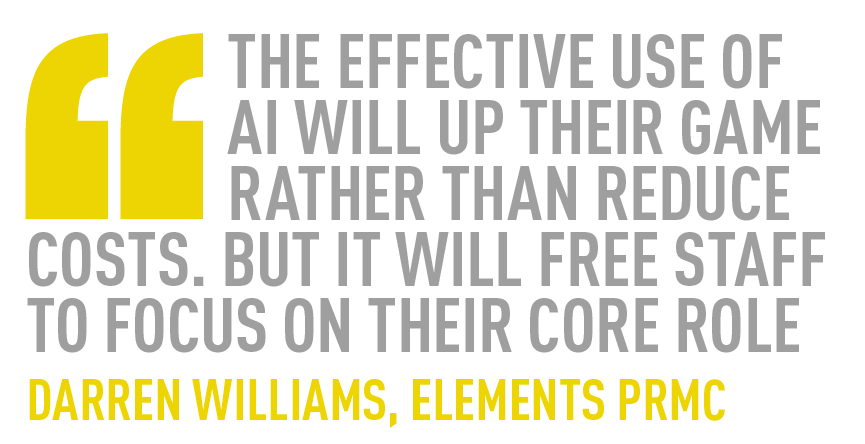Artificial intelligence (AI) has the potential to revolutionise car dealerships’ recruitment processes, according to experts.
The typical hiring process can take anywhere up to six weeks, not to mention the cost of advertising for the role and employing recruitment firms. Human error and inefficiencies in the screening process can make it more difficult to select the right candidate.
However, AI and ‘big data’ tools are increasingly being offered by vendors such as LinkedIn to sift through candidates’ profiles and match the most suitable person to the role. By doing so, they can identify those with data points that best fit a dealer’s list of key attributes in minutes, freeing up the HR department to focus on more pressing matters.
By lowering the cost of prediction, AI can ensure a cheaper, faster and more efficient recruitment process, as well as bridging the gap between supply and demand. However, it needs to be used in an ethical way that does not harm or unfairly disadvantage candidates, especially when they may not be aware of it.
Darren Williams, director at Elements PRMC, said the most relevant application for AI is in the initial screening process. Taking it a step further, he said it could also be used to select candidates for roles that have not yet become available.
“It will make the recruitment process much slicker, that’s for sure,” he said. “By constantly drip-feeding candidates into a recruitment pool it would be most advantageous to a dealer who suddenly loses one or two key sales executives and needs to recruit straight away.”
However, Williams was sceptical whether AI would reduce payroll costs and headcount. Rather, he said dealers could use it instead to enhance their recruitment process.
“The effective use of AI will up their game rather than reduce costs,” he said. “But it will also free up staff to focus on their core role rather than the recruitment process falling on the shoulders of someone with a different job description, as it so often does.”
Guy Liddall, the managing director of Motor Trade Select, said because AI will take more care of back-end operations, dealers will instead be focused on the recruitment of more customer-facing staff, drivers and technicians. It will also require employees of a different skillset that are more flexible to start with, he said.
“The type of people that we will be recruiting is difficult to predict, so I suspect that, at least in the short term, they will be highly adaptable and prepared to trial lots of new ideas,” he said. “Whether artificial intelligence will then pigeonhole people into areas where they can do the least damage and the most good, ensuring that we only recruit people who are within their very narrow bounds – gregarious, good customer-facing skills, patient, great at handling pressure, etc, time will tell.”
He added: “There is no doubt that many recruiters have already automated their recruitment process; our studies show that most candidates are aware that there is precious little human interaction in the recruitment process nowadays – a recent study we did suggests that less than 10% of candidates actually get what they would deem a human response to job applications. But will AI improve this, by making automated responses look more human, or increase this because we will all quickly get used to machine-created responses and recognise them? We now recognise standard template replies, which 30 years ago might have impressed us because they were personalised,” he said.
Karl Davis, Coachworks Consulting’s managing director, said while technology plays an important role in streamlining dealer operations and improving backroom and showroom efficiencies, there will also be a greater demand for inter-personal skills. Recruitment will also target those with a more consultative approach, in the vein of John Lewis or Apple employees whose skills can be honed to provide deep product knowledge of the latest technological features on a car, he said.
“As this consultative approach to car retailing becomes more prevalent, dealers will need to adjust their recruitment policies to attract the appropriate skills set,” he said.
“Dealers looking to the future have a rich pool of millennials from which to recruit and there will be high demand for bright, young tech-savvy candidates with excellent interpersonal skills.”
Alex Wright
Resources
WIRED Guide Technology magazine
Wired presents a potted history of artificial intelligence (AI).
![]() AI and the Future of Customer Experience
AI and the Future of Customer Experience
Eric Berridge, the chief executive of IT company Bluewolf, discusses the potential of AI to revolutionise customer service.
HOW Tech will change retail shopping
Technologist Taylor Romero presents a TED Talk on why retail shopping will benefit from technology.

















Arusha gupta - 11/09/2018 08:07
It’s surprising that HR has not seen much funding when compared to customer-oriented functions such as CRM. I believe the key success factor for any business are its own people Organizations need to shift their focus on people! Happy people lead to happy customers. If you hire right, engage right, and nurture your people right, then you will have happier customers and better business results.